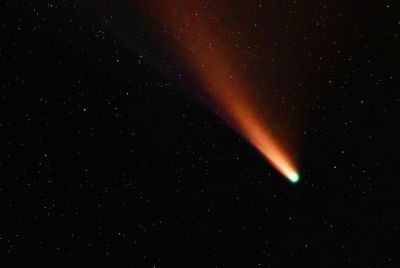Avi Loeb Reveals How Cosmic Dangers Like 3I/ATLAS Could Threaten Life on Earth
Loeb points out the vast difference between current global military budgets and the funding required for off-world survival

A new visitor from beyond our solar system is stirring up a profound debate, and one top scientist warns we should be paying closer attention. Harvard astrophysicist Avi Loeb suggests the interstellar object, comet 3I/ATLAS, displays a collection of puzzling features that challenge our understanding of natural comets.
As this enormous cosmic traveller speeds through our region of space, Loeb argues that its unusual characteristics could signal something much more extraordinary — and potentially dangerous — than a simple chunk of ice and rock.
Humanity's Precarious Position
Loeb recently discussed on X the existential dangers humanity confronts — ranging from planetary disasters to possible cosmic threats like the newly found interstellar object, 3I/ATLAS — and proposed that creating a permanent space settlement is our greatest safeguard against destruction.
'There are lots of risks on Earth', Loeb warned in the video, adding, 'It's not clear how long humanity would survive'. The astrophysicist, renowned for his ground-breaking studies of interstellar objects and the contentious Galileo Project, stressed that the planet's future existence is not assured.
Avi Loeb warns: take your vacation before October 29th #3IATLAS might change everything pic.twitter.com/oqskdN0xbB
— Surajit (@surajit_ghosh2) October 20, 2025
His remarks come amid rising global tensions and an increased understanding of dangers, both natural and cosmic — such as asteroid collisions and climate change — that can suddenly erase human society.
A Call to Realign Spending
Loeb suggests the smartest action is to fund and develop space settlements that can support human existence without relying on our home planet. 'One thing we should contemplate', he said, 'is building a habitat in space that we can go to from Earth just to save humanity, if there is a huge catastrophe looming over the horizon'.
The scientist underscored a clear difference between how the world currently allocates funds and what he considers the actual necessities for the continuation of our civilisation. 'If we invest a significant fraction of the military budgets worldwide towards going to space', he said, 'we're talking about a trillion dollars a year or so'.
Avi Loeb stated that instead of fighting among ourselves humanity should unite to explore space
— Surajit (@surajit_ghosh2) October 28, 2025
He warned that threats like #3IATLAS and other cosmic risks the future of life on Earth is uncertain
He urges that we should seriously consider building space habitats as a backup… pic.twitter.com/n6RqfyxNxU
Loeb noted that the world's military spending, estimated at about $2.4 trillion (£1.80 trillion) per year, could instead be dedicated to the peaceful, collaborative study of space.
'If we put a trillion dollars a year instead of fighting each other on Earth, but to explore space, we can in principle build a space platform that would accommodate people comfortably within a century', he said.
He contends that the difficulty lies not in scientific possibility but in political resolve and worldwide collaboration. 'I don't see a major issue', Loeb added. 'It's just a question of resources, putting all the architects, you know, the best scientists possible, and putting money into it such that we can accommodate people in space for long periods of time'.
Universal Alarm Bells
Loeb connected this future-focused outlook with the finding of interstellar visitors like 'Oumuamua and 3I/ATLAS, implying these events ought to remind people of the universe's enormous scale and its unforeseen nature. These space travellers, whether natural or constructed, act as 'wake-up calls', compelling society to look beyond immediate disputes and basic survival urges.
'If we can think about that, it means that others may have done that already', Loeb said, suggesting that highly developed alien societies may have already created lasting homes away from their native planets.
Finding proof of this kind of existence, he continued, would fundamentally alter what humanity considers important. 'Suddenly, we would realise there is a smarter kid on our block and that kid is more advanced than we are.'
Together or Not at All
Loeb concluded his remarks by calling for cooperation and a united effort, asserting that human disagreements are insignificant when compared to dangers from space. 'We are all in the same boat', he said. 'It makes no sense for us to be in conflict with each other all the time rather than work together and explore.'
His message aligns with his broader belief that scientific exploration and teamwork, rather than competition, will determine whether humankind survives. The presence of possibly dangerous space objects such as 3I/ATLAS, he suggested, should serve as a reminder that our time is short and the cosmos does not care.
To Loeb, the answer is straightforward yet crucial: change worldwide focus from conflict to discovery, and from rivalry to teamwork. 'It's just a question of priorities', he said, 'and this will be potentially a wake-up call if we noticed that someone else did it'.
© Copyright IBTimes 2025. All rights reserved.






















